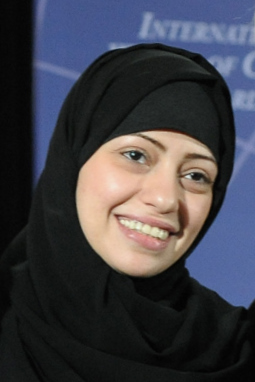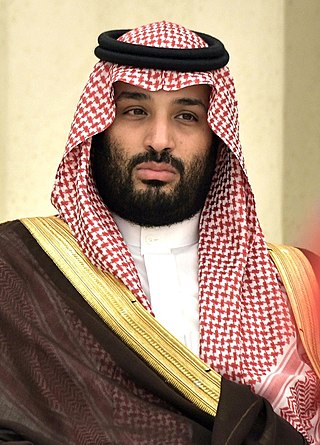| |||||
| Decades: | |||||
|---|---|---|---|---|---|
| See also: | Other events of 2010 History of Saudi Arabia | ||||
The following lists events that happened during 2010 in Saudi Arabia .
| |||||
| Decades: | |||||
|---|---|---|---|---|---|
| See also: | Other events of 2010 History of Saudi Arabia | ||||
The following lists events that happened during 2010 in Saudi Arabia .

Saudi Arabia, officially the Kingdom of Saudi Arabia (KSA), is a country in Western Asia. It covers the bulk of the Arabian Peninsula, and has a land area of about 2,150,000 km2 (830,000 sq mi), making it the fifth-largest country in Asia, the second-largest in the Arab world, and the largest in Western Asia and the Middle East. It is bordered by the Red Sea to the west; Jordan, Iraq, and Kuwait to the north; the Persian Gulf, Qatar and the United Arab Emirates to the east; Oman to the southeast; and Yemen to the south. Bahrain is an island country off the east coast. The Gulf of Aqaba in the northwest separates Saudi Arabia from Egypt. Saudi Arabia is the only country with a coastline along both the Red Sea and the Persian Gulf, and most of its terrain consists of arid desert, lowland, steppe, and mountains. Its capital and largest city is Riyadh. The country is home to Mecca and Medina, the two holiest cities in Islam.

The cultural setting of Saudi Arabia is greatly influenced by the Arab and Islamic culture. The society is in general deeply religious, conservative, traditional, and family-oriented. Many attitudes and traditions are centuries-old, derived from Arab civilization and Islamic heritage. However, its culture has also been affected by rapid change, as the country was transformed from an impoverished nomadic society into a rich commodity producer in just a few years in the 1970s. This change has also been affected by and the result of a number of factors including the communications revolution and external scholarships. The most recent ruler or king of Saudi is King Salman of Saudi Arabia.

Human rights in Saudi Arabia are a topic of concern and controversy. The Saudi government, which mandates both Muslim and non-Muslim observance of Islamic law under the absolute rule of the House of Saud, has been accused of and denounced by various international organizations and governments for violating human rights within the country. The authoritarian regime ruling the Kingdom of Saudi Arabia is consistently ranked among the "worst of the worst" in Freedom House's annual survey of political and civil rights.

Lesbian, gay, bisexual, transgender (LGBT) people in Saudi Arabia face severe repression and legal challenges not experienced by non-LGBT residents, Both male and female same sex, sexual activity is illegal.

The history of the Jews in the territory of modern Saudi Arabia begins in Biblical times, at least as early as the First Temple period.

Women's rights in Saudi Arabia are a topic of concern and controversy internationally. Saudi women have experienced major rights reforms since 2017, after facing religious fundamentalist dominance dating from 1979. According to Human Rights Watch and Amnesty International, women in Saudi Arabia experience discrimination in relation to marriage, family, and divorce, despite recent reforms. The Saudi government continue to target and repress women's rights activists and movements. Prominent feminist campaigns include the Women to Drive Movement and the anti male-guardianship campaign. These campaigns have resulted in significant advances in women's rights. Women's societal roles in Saudi Arabia are heavily affected by Islamic and local traditions of the Arabian Peninsula. The Hanbali and Wahhabi schools of Sunni Islam as well as the traditions of the Arabian Peninsula and national and local laws, all impact women's rights in Saudi Arabia.

The Saudi passport is a passport document issued to citizens of Saudi Arabia for international travel. It is valid for five or ten lunar years.

The National ID Card, commonly known by its old colloquial name Biṭāgat Al-ʼaḥwāl, is a Saudi Arabian identity card and proof of citizenship. The card is used for identification with "government agencies and third party service providers such as banks". The card may also be used for travel within the countries of the Gulf Cooperation Council (GCC). Since April 2010.

As a result of its high level of immigration and emigration and its status as common source and destination for a large amount of international travel the United States has more incoming and outgoing international child abductions per year than any other country. To address this issue the United States played an active role in the drafting of the 1980 Hague Convention on the Civil Aspects of International Child Abduction Although the United States was one of the first nations to sign the Convention in 1981 the Convention did not enter into force for the US until 1988 with the enactment by Congress of the International Child Abduction Remedies Act which translated the Convention into US law.

The legal system of Saudi Arabia is based on Sharia, Islamic law derived from the Qur'an and the Sunnah of the Islamic prophet Muhammad. The sources of Sharia also include Islamic scholarly consensus developed after Muhammad's death. Its interpretation by judges in Saudi Arabia is influenced by the medieval texts of the literalist Hanbali school of Islamic jurisprudence. Uniquely in the Muslim world, Sharia has been adopted by Saudi Arabia in an uncodified form. This, and the lack of judicial precedent, has resulted in considerable uncertainty in the scope and content of the country's laws. The government therefore announced its intention to codify Sharia in 2010, and, in 2018, a sourcebook of legal principles and precedents was published by the Saudi government. Sharia has also been supplemented by regulations issued by royal decree covering modern issues such as intellectual property and corporate law. Nevertheless, Sharia remains the primary source of law, especially in areas such as criminal, family, commercial and contract law, and the Qur'an and the Sunnah are declared to be the country's constitution. In the areas of land and energy law the extensive proprietorial rights of the Saudi state constitute a significant feature.

Samar bint Muhammad Badawi is a Saudi Arabian human rights activist. She and her father filed court cases against each other. Badawi's father accused her of disobedience under the Saudi Arabian male guardianship system and she charged her father with adhl—"making it hard or impossible for a person, especially a woman, to have what she wants, or what's rightfully hers; e.g, her right to marry" according to Islamic jurisprudence—for refusing to allow her to marry. After Badawi missed several trial dates relating to the charge, an arrest warrant was issued for her, and Badawi was imprisoned on 4 April 2010. In July 2010, Jeddah General Court ruled in Samar Badawi's favor, and she was released on 25 October 2010, and her guardianship was transferred to an uncle. There had been a local and international support campaign for her release. The Saudi NGO Human Rights First Society described Badawi's imprisonment as "outrageous illegal detention".

Mohammed bin Salman Al Saud, colloquially known by his initials MBS or MbS, is Crown Prince and Prime Minister of Saudi Arabia. He also serves as the chairman of the Council of Economic and Development Affairs and chairman of the Council of Political and Security Affairs. He is considered the de facto ruler of Saudi Arabia, being deemed as such even before his appointment as prime minister in 2022. He served as minister of defense from 2015 to 2022. He is the seventh son of King Salman.

The modern history of Saudi Arabia begins with the declaration of the unification of Saudi Arabia in a single kingdom in 1932. This period of time in Saudi Arabia's history includes the discovery of oil in Saudi Arabia and many invents. It goes on to encompass Saudi Arabia's brief involvement in World War II in 1945. Afterwards, it includes Saudi Arabia's involvement in the Western Bloc and the Cold War. It also includes Saudi Arabia's proxy conflict with Iran, the Arab Spring, and the ongoing Arab Winter.

Visitors to Saudi Arabia must obtain a visa unless they come from one of the visa exempt countries. Some visitors are eligible to obtain a visa online or on arrival while others needs to apply at one of the Saudi diplomatic missions in advance.
Saudi Arabia is, as with many aspects of daily life, organized according to the principles of Islam, which is the official religion of the country, and which puts emphasis on the importance of knowledge, study, and understanding. The religion believes that obtaining knowledge is the only way to gain true understanding of life, and as such encourage both males and females to study. The way of practicing Wahhabi Islam has therefore led to segregation in education in Saudi Arabia, and in turn has created segregation in political, economic, and labor force environments. With the current struggle of social norms and laws, women have made great strides to obtain education in Saudi Arabia. However great these strides may be, there are consequences to the economy from not allowing women to have access to equal education, including potential economic struggle.

Saudi Vision 2030 is a strategic framework to reduce Saudi Arabia's dependence on oil, diversify its economy, and develop public service sectors such as health, education, infrastructure, recreation, and tourism. Key goals include reinforcing economic and investment activities, increasing non-oil international trade, and promoting a softer and more secular image of the Kingdom. It also consists of increasing government spending on the military, as well as manufacturing equipment and ammunition.
Walī is an Arabic word with a number of meanings, including, "protector", "helper", "a man close to God", or "holy man", etc. "Wali" can also mean a "legal guardian", or ruler; someone who has "Wilayah" over somebody else, and in fiqh is often "an authorized agent of the bride in concluding a marriage contract ",
The anti male-guardianship campaign is an ongoing campaign by Saudi women against the requirement to obtain permission from their male guardian for activities such as getting a job, travelling internationally or getting married. Wajeha al-Huwaider deliberately tried to travel internationally without male guardianship permission in 2009 and encouraged other women to do likewise. Women activists wrote a letter to the Saudi Minister of Labor and brought media attention to the issue in 2011. A 14,000-signature petition was given to royal authorities by Aziza al-Yousef in 2016 following a Human Rights Watch report on male guardianship. A crackdown against the activists took place in mid-May 2018, with 13 arrests as of 22 May 2018. Several of the women remained in prison as of December 2018. Some of the women activists were tortured, including supervision by Saud al-Qahtani, a close advisor of Crown Prince Mohammad bin Salman.
Absher is a smartphone application which allows citizens and residents of Saudi Arabia to use a variety of governmental services. Amongst several other services with the Absher app, it can be used to apply for jobs and Hajj permits, passport info can be updated, and electronic crimes can be reported. The application provides over 279 services for residents of Saudi Arabia including but not limited to making appointments, renewing passports, residents' cards, IDs, driver's licenses and others, and, controversially, enables Saudi men to track the whereabouts of women they control as part of the country's male guardianship system.
Feminism in Saudi Arabia dates back to the ancient, pre-Roman Nabataean Kingdom in which women were independent legal persons. Twenty-first century feminist movements in Saudi Arabia include the women to drive movement and the anti male-guardianship campaign. Madawi al-Rasheed argued in 2019 that the Saudi feminist movement was "the most organised and articulate civil society" in Saudi Arabia.